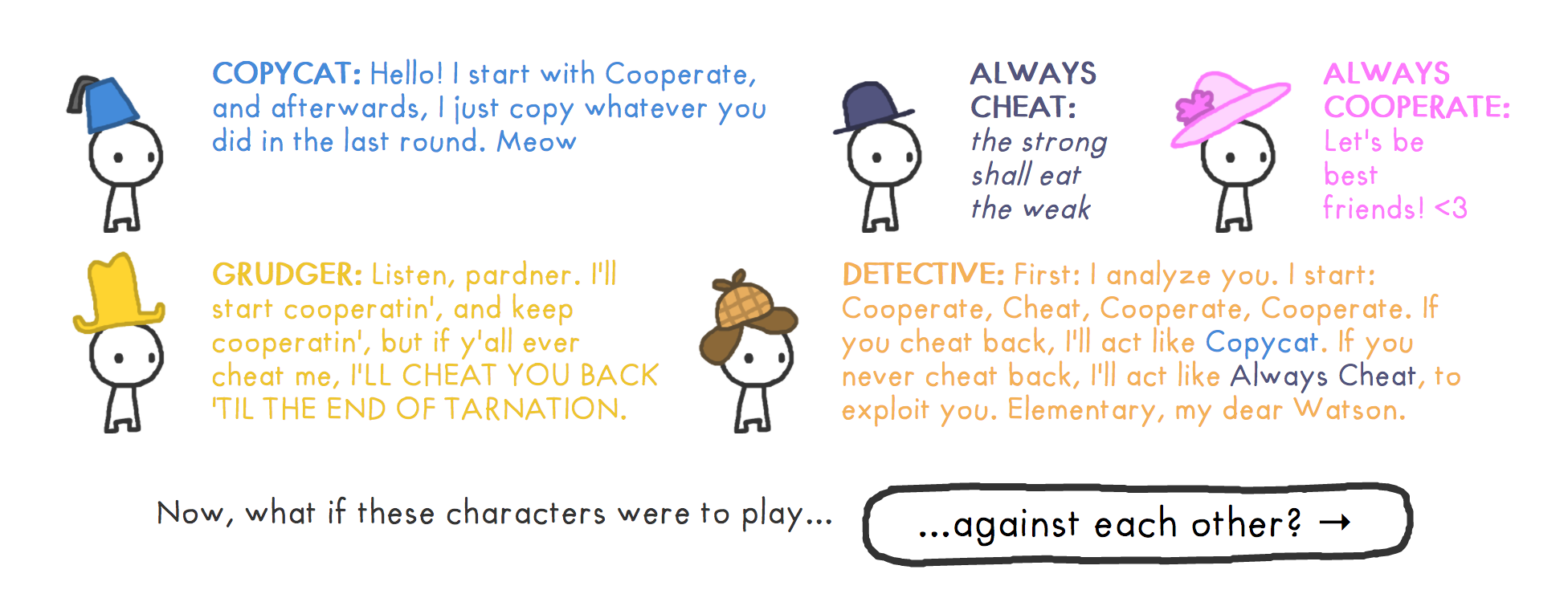"Learn how to see. Realize that everything connects to everything else." -Leonardo da Vinci
Game Theory of Trust
In the current divisive political climate, fewer people are willing to trust each other.1 Why has this happened and how can we fix it? These are complex questions that I have struggled to wrap my head around over the past couple of years. The 2016 election coincided with my entrance into the “real world” and my move to the greater D.C. area, which primed me to watch closely. With friends and family on both sides of the fence, I’ve read Facebook comment wars, emphatic Twitter threads, and insistent open letters. Social media has a role in exposing and perhaps perpetuating this declining trust, but more on that later. As a computer scientist and “numbers person”, the best explanation of this breakdown of trust that I have seen comes not from a speech or an article, but a game.
If you don’t read the rest of this post, go to http://ncase.me/trust/ and play the game The Evolution of Trust created by Nicky Case 2. As stated at the conclusion,
“If there’s one big takeaway from all of game theory, it’s this: What the game is, defines what the players do. Our problem today isn’t just that people are losing trust, it’s that our environment acts against the evolution of trust. That may seem cynical or naive – that we’re “merely” products of our environment – but as game theory reminds us, we are each others’ environment. In the short run, the game defines the players. But in the long run, it’s us players who define the game.”

What I love about the experience of playing this game is that you learn that there are things we can do as individuals to evolve trust. The first is to build relationships – repeat interactions are necessary. Making friends with people who think differently than you and having real, respectful discussions with them is easy in theory and hard in practice. The second is to find win-wins. Bringing back the art of compromise means avoiding the “us versus them” mentality, or disagreeing with an idea because you think you disagree on everything with the person who had it.
Finally, encourage clear communication. The more mistakes, lies, and misinterpretation, the more distrust. With increased communication through the internet and social media comes increased miscommunication. Communication is a two-way street, with listening and understanding on the receiving end. Modern media is strengthening our ability to scan, skim, and multitask, but eroding our capacity for critical thinking and inductive analysis 3. This makes it easier for powerful people to claim falsehoods as truths. With such a fast-paced news cycle, it is important to take time to consider the complexity of issues we face and to hold our sources of information to high standards.
Why does building trust matter in the real world? In environments with low repeat-interactions, it becomes more beneficial to be exploitative. An environment with high miscommunication breeds vengeance and cynicism. A world where no one trusts in one another leads to a race to the bottom. However, in a word where people trust one another, we can all find ways to come out ahead. That’s the world I want to live in.
1 In fact, trust has been declining for the last 40 years.
2 To learn more about the books and game theory strategies this game was based on, check out Nicky’s footnotes.
3 See my last post, The Shallows for more on how the internet is changing the way we think.
< Back to blog
Meet Lizzie
- I’ll never turn down a chance to go boogie boarding.
- I’m a Pixar aficionado.
- When I take notes, they're 50% doodles.